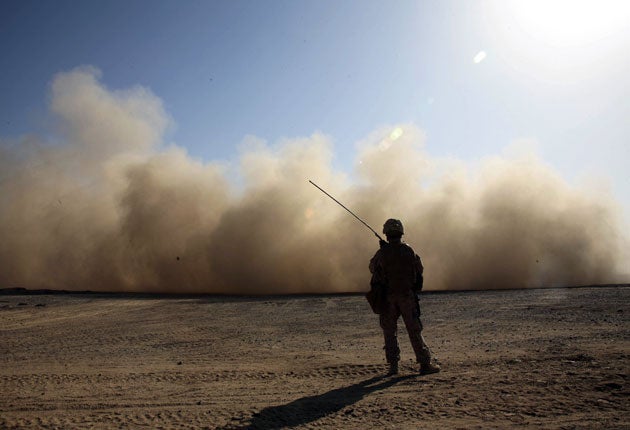Toll grows as Afghan offensive enters second week
Karzai warns Operation Moshtarak is killing too many civilians

Your support helps us to tell the story
From reproductive rights to climate change to Big Tech, The Independent is on the ground when the story is developing. Whether it's investigating the financials of Elon Musk's pro-Trump PAC or producing our latest documentary, 'The A Word', which shines a light on the American women fighting for reproductive rights, we know how important it is to parse out the facts from the messaging.
At such a critical moment in US history, we need reporters on the ground. Your donation allows us to keep sending journalists to speak to both sides of the story.
The Independent is trusted by Americans across the entire political spectrum. And unlike many other quality news outlets, we choose not to lock Americans out of our reporting and analysis with paywalls. We believe quality journalism should be available to everyone, paid for by those who can afford it.
Your support makes all the difference.Coalition forces in southern Afghanistan were trying to break down stiff resistance from insurgents yesterday as Operation Moshtarak entered its second week amid fresh warnings about civilian casualties.
Small teams of rebel snipers took pot-shots with rocket-propelled grenades as UK, US and Afghan forces tried to make contact with people from Marjah, a Taliban stronghold which has been a hotbed for opium production. Roadside bombs also continued to hamper the progress of the troops in streets, deserted by people fleeing the fighting.
The Ministry of Defence yesterday named Lance Sergeant David Walker, 36, of the 1st Battalion Scots Guards, as one of the most recent British soldiers to die in the conflict. He was shot on Thursday at Nad-e-Ali. L/Sgt Walker, from Strathclyde, was described as "quite simply tough as old boots" by his commanding officer. The Defence Secretary, Bob Ainsworth, said he was a "highly respected" man of "great character and skill".
He was killed on the same day as Lieutenant Douglas "Dougie" Dalzell, of the Coldstream Guards, who died in an explosion on his 27th birthday. So far, three British soldiers have been killed in the offensive.
The march on Marjah is one of the main thrusts of Operation Moshtarak, involving 15,000 troops and the largest attempt to flush out Taliban fighters since the conflict in Afghanistan began in 2001. Nearly a third of those involved are British personnel.
Army officials said on Friday two thirds of the target region had been cleared of Taliban fighters, but as troops inched further across Helmand province yesterday, Afghan president Hamid Karzai issued another warning that too many civilians were dying in the counter-insurgency offensive.
In a speech to the new Afghan parliament, he held up a picture of an eight-year-old girl who saw 12 relatives killed in a misdirected rocket attack last weekend. In another incident on Friday, a man was shot dead because he was suspected of having a bomb. The object in his hands had been a box.
"We need to reach the point where there are no civilian casualties," Mr Karzai said. "Our criticism will continue until we reach that goal." Soldiers were briefed again yesterday on the need to protect civilians.
Mr Karzai also tried to reach out to the insurgents himself, calling on them to put down their weapons and join in with the "reconstruction" of Afghanistan. "End this war. Return to your homes and help rebuild," he said.
US Marines have spent the last two days trying to get behind enemy lines in an attempt to reduce the risk of sniper fire. Rocket attacks killed six insurgents as they tried to lay explosive devices in a road, while two others died when their bomb accidentally exploded in their arms. Losses on the coalition side include six Afghan police who were killed by militants as they tried to clear a poppy field on Friday.
Meanwhile, the future presence of Dutch soldiers in Afghanistan was thrown into doubt after the collapse of the country's coalition government in a row over its withdrawal programme. The Prime Minister, Jan Peter Balkenede, said the three way alliance had fallen apart because "there is no trust". The Netherlands has 1,600 soldiers in Uruzgan, southern Afghanistan. It has suffered 21 fatalities since joining the coalition in 2006 and public opinion polls suggest support for their involvement is waning.
Join our commenting forum
Join thought-provoking conversations, follow other Independent readers and see their replies
Comments